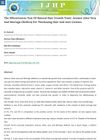 February 2024 in “International Journal of Health and Pharmaceutical”
February 2024 in “International Journal of Health and Pharmaceutical” Avemor, a natural tonic made from aloe vera and moringa, was less effective than minoxidil in promoting hair growth on rabbits.
 March 2022 in “Zenodo (CERN European Organization for Nuclear Research)”
March 2022 in “Zenodo (CERN European Organization for Nuclear Research)” Some Indonesian plants might help with hair growth, but research methods need improvement.
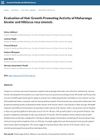 November 2019 in “Journal of Health and Allied Sciences”
November 2019 in “Journal of Health and Allied Sciences” Maharanga bicolor and Hibiscus rosa sinensis extracts promote hair growth.

Pimpinella anisum L. extract significantly boosts hair growth in mice.
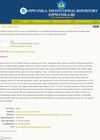
Cocor Bebek leaf extract may promote hair growth better than minoxidil at high concentrations.
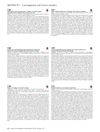 April 2018 in “Journal of Investigative Dermatology”
April 2018 in “Journal of Investigative Dermatology” FOL-005, a hair growth promoter, acts locally on mouse skin where injected and could be a promising hair loss treatment.
 January 2017 in “Journal of Investigative Dermatology Symposium Proceedings”
January 2017 in “Journal of Investigative Dermatology Symposium Proceedings” The 2015 Hair Research Congress concluded that stem cells, maraviroc, and simvastatin could potentially treat Alopecia Areata, topical minoxidil, finasteride, and steroids could treat Frontal Fibrosing Alopecia, and PTGDR2 antagonists could also treat alopecia. They also found that low-level light therapy could help with hair loss, a robotic device could assist in hair extraction, and nutrition could aid hair growth. They suggested that Alopecia Areata is an inflammatory disorder, not a single disease, indicating a need for personalized treatments.
January 2017 in “Figshare” The herbal mix with Houttuynia cordata, Perilla frutescens, and green tea boosts hair growth in mice.
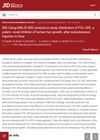 April 2016 in “Journal of Investigative Dermatology”
April 2016 in “Journal of Investigative Dermatology” FOL-005, a new substance, was found to reduce hair growth without toxicity when injected into skin, suggesting it could be used to treat excessive hair growth.
Monegy, a mix of certain plant extracts, may promote hair growth and repair.
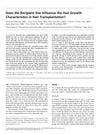 September 2002 in “Dermatologic Surgery”
September 2002 in “Dermatologic Surgery” The recipient site can affect the growth and survival of transplanted hair but not its thickness.
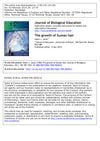 September 1984 in “Journal of Biological Education”
September 1984 in “Journal of Biological Education” Human hair growth involves active, resting, and intermediate phases, and examining plucked hairs can teach students about hair biology and diseases.
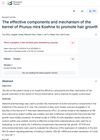 May 2022 in “Research Square (Research Square)”
May 2022 in “Research Square (Research Square)” Prunus mira Koehne kernels contain components like Vitamin E, β-sitosterol, and linoleic acid that can promote hair growth in mice.
 136 citations,
February 2017 in “International Journal of Molecular Sciences”
136 citations,
February 2017 in “International Journal of Molecular Sciences” PRP treatment improves hair growth, and the device used can affect results, with some being more effective.
42 citations,
June 2019 in “Aging” 3,4,5-tri-O-caffeoylquinic acid promotes hair growth by activating the β-catenin pathway.
 41 citations,
July 2002 in “Clinical and Experimental Dermatology”
41 citations,
July 2002 in “Clinical and Experimental Dermatology” Effective hair loss assessment requires a mix of precise measurement methods.
 12 citations,
May 2017 in “Pharmacology & therapeutics”
12 citations,
May 2017 in “Pharmacology & therapeutics” Targeting immune tolerance issues in Alopecia Areata could restore hair growth and maintain remission.
 1 citations,
September 2022 in “Pharmaceutics”
1 citations,
September 2022 in “Pharmaceutics” The stiffness of a wound affects hair growth during healing, with less stiff areas growing more hair.
1 citations,
January 2020 in “Indian journal of dermatology, venereology, and leprology” CD117 and platelet-derived growth factor receptor α may play a role in alopecia areata.
 April 2024 in “Cognizance journal”
April 2024 in “Cognizance journal” The alexandrite laser effectively reduces unwanted hair by about 75%.
February 2017 in “The journal of allergy and clinical immunology/Journal of allergy and clinical immunology/The journal of allergy and clinical immunology” Immunotherapy helped a 5-year-old boy regrow hair and prevent seasonal alopecia areata.
Gushen Shengfa pills and Wuling capsules are more effective for hair growth and sleep quality than the control treatment.
 65 citations,
January 2009 in “Annals of Dermatology”
65 citations,
January 2009 in “Annals of Dermatology” Zinc supplements increased zinc levels in some hair loss patients but didn't significantly improve hair growth.
 1 citations,
March 2010 in “Internal medicine journal”
1 citations,
March 2010 in “Internal medicine journal” A 72-year-old man with sudden taste issues and hair growth was diagnosed with a severe stomach cancer and died within 5 months.
 November 2020 in “Journal of The American Academy of Dermatology”
November 2020 in “Journal of The American Academy of Dermatology” Oral JAK inhibitors help regrow hair in alopecia patients.
 17 citations,
October 2003 in “Brazilian Journal of Medical and Biological Research”
17 citations,
October 2003 in “Brazilian Journal of Medical and Biological Research” The gene SDR5A1 is found in scalp hair of both hirsute and normal individuals, but it does not explain differences in hair growth.
 10 citations,
July 2015 in “Journal of Cosmetic Dermatology”
10 citations,
July 2015 in “Journal of Cosmetic Dermatology” Higher DKK-1 levels found in hair loss patients; L-ascorbic acid 2-phosphate, L-threonate, and ginsenoside F2 may help promote hair growth.
 7 citations,
June 2019 in “Cureus”
7 citations,
June 2019 in “Cureus” Fractional lasers and microneedling, combined with topical agents, could potentially treat Alopecia Areata effectively, but more research is needed due to limited data.
 2 citations,
January 2017 in “Clinical and medical investigations”
2 citations,
January 2017 in “Clinical and medical investigations” Herbal lotions are effective for severe hair loss, with a 64.8% success rate, but relapse is common and long-term management requires allergen control and possible corticosteroid use.
4 citations,
December 2021 in “Applied sciences” Micro-needling with low-level light therapy effectively increases hair growth in people with mild to moderate hair loss.






















